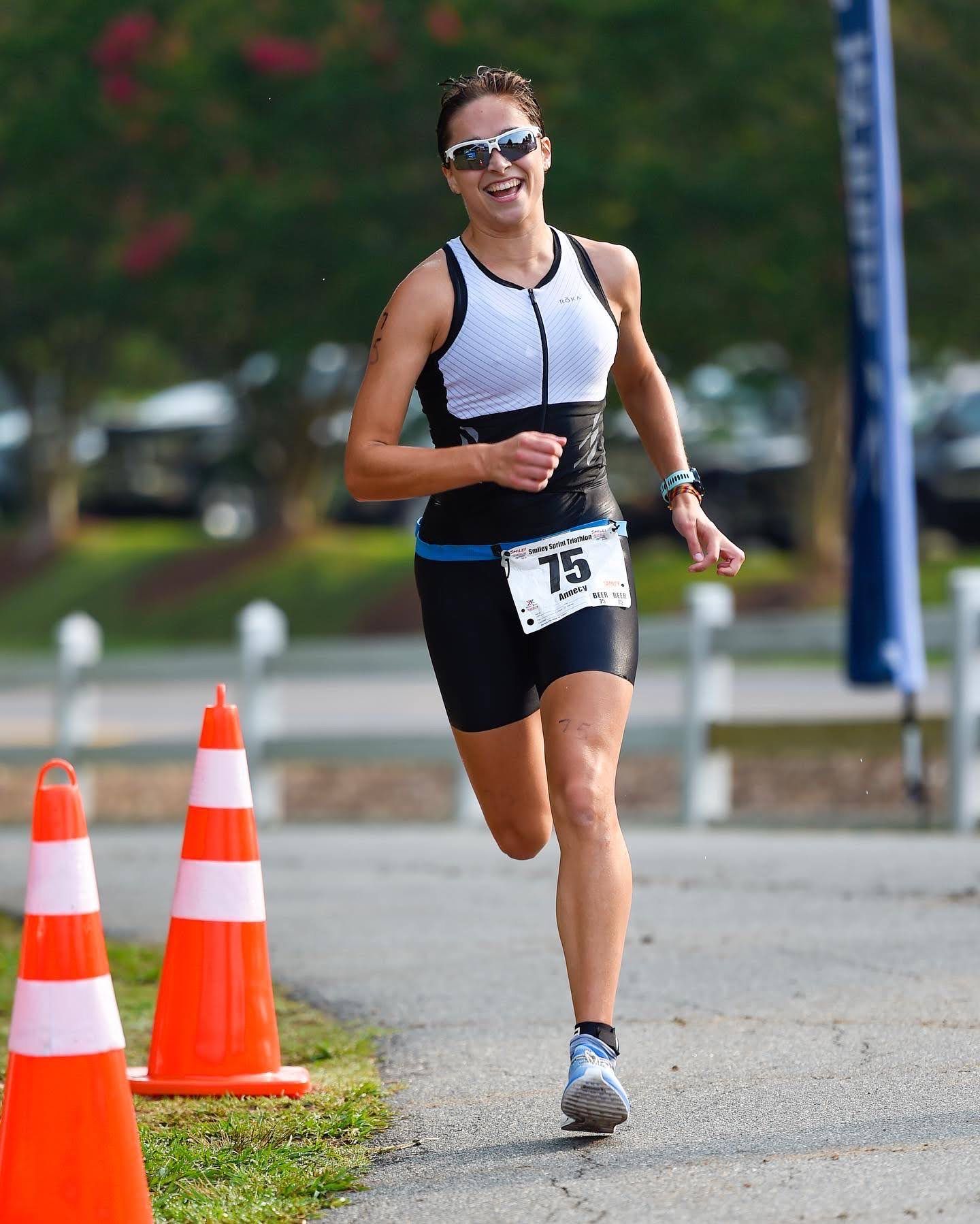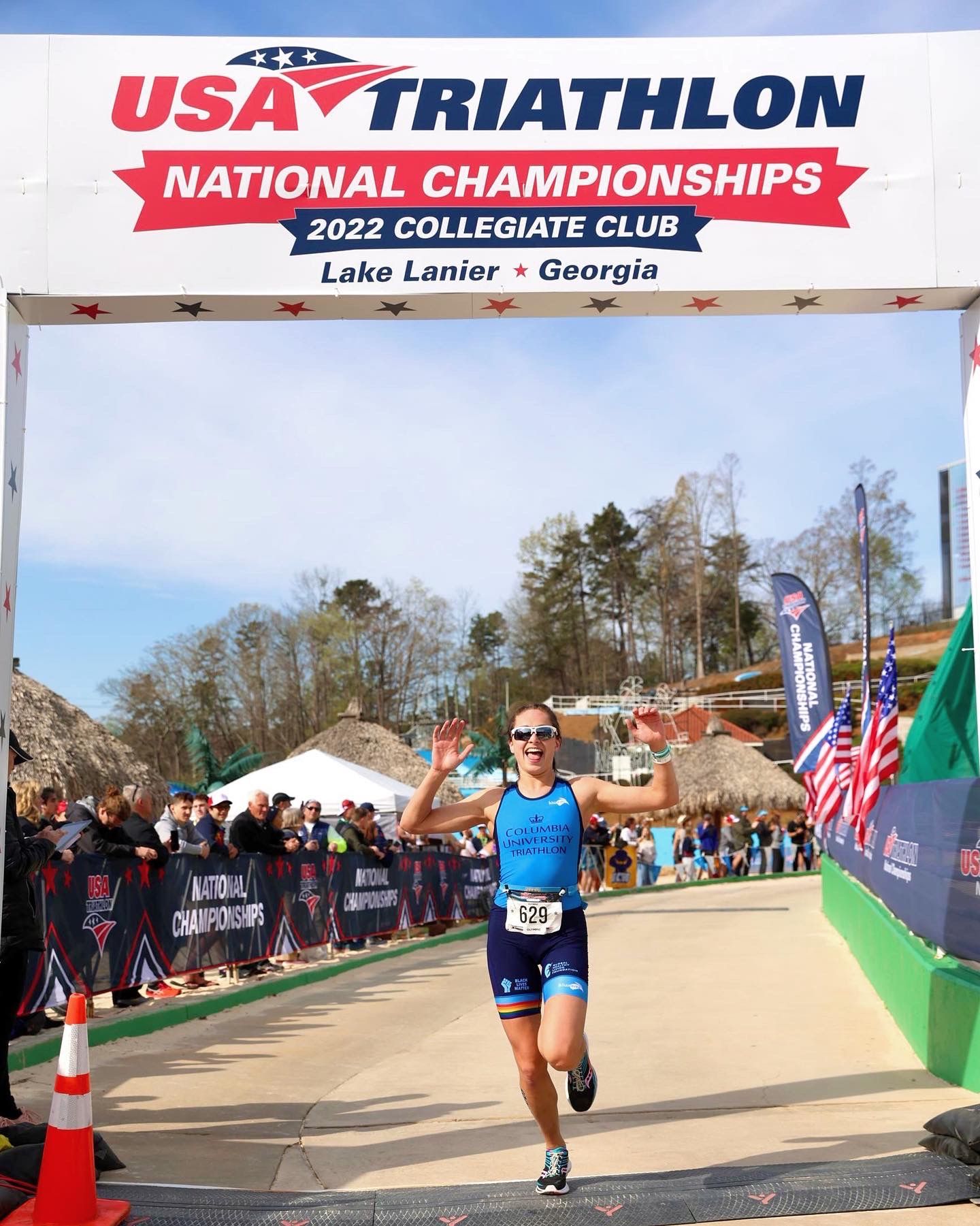Runners Q&A: Annecy Daggett
Runners Q&As are part of a premium subscription to RunningShorts.org. Want to recommend someone who should be featured? Email eddiewooten@gmail.com.

Whether Annecy Daggett, the 2021 winner of the women's division in the Smiley Sprint Triathlon, could win again Sunday is not the point.
It's this: She'll start the race, and she'll finish it. And that's extraordinary, because only nine months ago, a car struck the Columbia University master's student from Winston-Salem and threw her from her bicycle while she rode with triathlon club teammates in New York. The accident, which she doesn't remember, left her with two plates and 10 screws in her left leg.
"It's never been a question of 'if I'll get back to it,' she says of competing in triathlons. "It's always been a question of 'when I'll get back to it.'"
Besides the hardware, the accident left Daggett with plenty of resolve.
"I want do an Ironman," she says. "That's always been a goal of mine, growing up watching my dad race Ironmans.
"But after this accident, particularly, I want to do it even more."
Annecy Daggett is the subject of today's Runners Q&A.
RS: The last nine months have been quite the ordeal for you. How are you?
Daggett: "I'm still dealing with the aftermath of it. It's been a really long road to get back to where I am, and I still have a long way to go to get back to where I was before the accident.
"It's affected so many different areas of my life. Not just physically, but I had to take some time off from school, so I'm graduating a little bit later. And I'm still making up classwork and things like that. It's still having quite an effect on my life and can still feel kind of overwhelming at times."
Age: 24.
Residence: Winston-Salem.
Family: Mother, Cynthia; father, David; sister, Emmaline, 22; brother, Riley, 21.
Education: Will complete a master's degree in mental health counseling at Columbia University in New York City in October; bachelor of science in psychology at William & Mary; graduate of Reynolds High School.
RS: The accident took place on Oct. 22, 2022. How much do you remember about it?
Daggett: "I don't remember the accident at all. What I know is just from what I've been told. I was riding with two teammates: What I've been told from them and the police report.
"I was riding along the 9W, which is a very popular road for cyclists. It was Saturday morning; lots of cyclists were out. I was riding with two teammates, and a car coming in the opposite direction was making a (left) turn and turned right into me.
"From what I've been told, I was flown into a pole and then hit the ground. But I don't remember it. So I don't know exactly what happened.
"(The driver) stopped, and his wife was in the car with him. And I forget exactly her job, but she does something in the medical field. So she got out of the car and helped me. And there was another car that had a doctor in it, and they stopped and were helping me on the scene. The driver didn't face any charges that I know of. But he stopped, and his insurance has been covering my medical bills."

RS: What injuries did you sustain?
Daggett: "I shattered the top of my tibia. Right below the kneecap, the top of that bone had multiple breaks in it. And where they put in the plates and the screws.
"It was mainly just the leg, fortunately. I did have a concussion, but they weren't too worried about that. I was wearing a helmet; it probably saved my life. But other than the broken bones in my leg, it was just some bruising and scraping."

RS: What have the recovery and rehab been like?
Daggett: "When I first got out of the hospital (after 10 days), I was using a walker. And then maybe a week or so later, I moved to crutches. I was on crutches for about three months. At first, no weight on my injured leg. And then working up to putting a little bit of weight on my injured leg and eventually moving down to one crutch. Once I got off crutches, I was still limping when I walked a bit.

“I lost so much muscle in my left leg, and I'm still working on building that muscle back. I've done lots of physical therapy to help build muscle back.
“Also to get back the movement in my knee. When I first got out of the hospital, my knee would barely bend. It got so stiff. And it took me months just to get my knee to bend to 90 degrees. My knee is back to bending a functional amount, but it doesn't bend as much as the other knee. So I still have that stiffness that I'm trying to work through."
RS: How much pain are you experiencing now?
Daggett: "On a day-to-day basis, I'm not really experiencing any pain. I'll have a little bit when I try to run and things like that.
"In the beginning, I was in a lot of pain. I was on a lot of pain medicines. The first few days in the hospital, I've never been in pain anything like that before in my life.
"When I got home from the hospital for the first week or two, I was waking up in the middle of the night in so much pain and having to take pain medicine in the middle of the night because I couldn't sleep if I didn't take it throughout the night."
RS: To compete in a triathlon, you have to be able to swim and cycle and run. How have you put yourself in a position to even think about doing this triathlon?
Daggett: "It's never been a question of 'if I'll get back to it.' It's always been a question of 'when I'll get back to it.'
“When I was in the hospital, one of the doctors gave me an estimate: 'Oh, you'll be able to run, hopefully, in about nine months.' And in my head, I'm doing the calculations. 'Oh, you know what's in nine months? Smiley.' Then and there, I set that as my goal. I want to get back and do Smiley, even if it means I'm walking the run.
“I wasn't doing any swimming, biking or running from October until about mid-January. But when I got cleared by my doctor to get back into the pool, I started swimming with my club triathlon team here at Columbia. I started out once a week but built up to swimming two to three times a week and just doing that consistently. And at this point, my swim has gotten to be the fastest it's ever been, which is kind of shocking to me coming out of an injury.
“And then the bike took a little longer because of the stiffness in my knee. It took a while to even be able to pedal all the way around on a bike. I started indoors, just practicing, getting the movement back in my knee so I could even pedal all the way around.
“And my bike was also totaled in the accident. I had to get a new bike, which is actually very exciting because my old bike was a hand-me-down from a friend of my dad's. This was the first time I was getting a bike that was new and for me, and I got a bike fit. I'm obsessed with my new bike.
“But as soon as I got the bike and was able to ride, I started doing some short rides in Central Park (in April) and have just been building it up as I go. The swimming and the biking have come back, honestly, pretty quickly. I'm surprised at how well my swimming and my biking are doing.
“The running has really been the hardest part because I lost so much muscle and so much strength. I started out jogging a minute and walking a minute for 10 minutes at a time at physical therapy. I started out on the treadmill (in March). And then I've just been working it up. It's been maybe the past month or so where I started being able to run longer without walking.
“Last weekend, I ran a 5K without walking. That was really exciting for me; it's the first time I had done that. So it's just been building it back up really, really slowly. And my running is still a lot slower than it was.
“But I can finally run again, and that feels so good.”
RS: When you got back on your bike, outdoors, what was that experience like, given what you had gone through?
Daggett: "At the beginning, I was really nervous. Interestingly, I wasn't so nervous about the cars because, hopefully, fingers crossed, it's a once-in-a-lifetime thing to get hit by a car. Hopefully that's not going to happen again. I'm very careful when I'm biking on the roads, too.
"I was nervous about getting back on a bike. It had been so long. They say, 'Once you know how to ride a bike, you know how to ride a bike, you're not going to just forget.' But what if I get on and I don't remember how to balance? It was just a lot of nerves about getting on a bike for the first time.
"But once I did it, I felt so good. I'm ready to go now, once I did that first ride."
RS: How much has this tested you as an athlete?
Daggett: "This has been the most difficult thing I've ever gone through in my life. It's hard because being an athlete feels like such a central part of my identity. I've been running since I was 10 years old. I ran track and cross country in middle school and high school and ran all throughout college and have also been doing triathlons since I was 11. That's when I did my first one and have really gotten into triathlons more seriously over the past few years.
"So it's such a core part of who I am, and not being able to do that was really hard. But also hard because exercising is a way for me to relieve stress and just kind of help my mental health. So not being able to do that was hard in that aspect, too."
RS: How much has being an athlete helped you during recovery and maybe shown those doctors that they didn't know who they were dealing with?
Daggett: "Triathlon, in particular, is so important to me. It's such a passion. It's something I love so much. I'm going to get back no matter what it takes.
"I've done hard, athletic things. I ran a marathon; that was the hardest thing I'd ever done before this. I've done a half Ironman. I've done physically challenging things, so I know I can do it. And I know I can get through the pain, even though it's really tough in the moment.
"I can do this, and I'm going to do this, whatever it takes."
RS: Because of the accident, are there things that you've been able to tell are going to be side effects or things that you're just going to have to deal with going forward?
Daggett: "The first thing that I thought of is numbness in my leg from where nerves were damaged during the surgery. Some of that is going to be forever, which doesn't affect me athletically but it's just a weird thing to not be able to feel parts of my leg.
"The stiffness in my knee: Some of that is going to be really long-lasting. Even though my knee moves well enough that it doesn't affect me anymore, it still has that stiffness.
"And it's still going to be a long time before I'm 100% back to being able to run the way I could run before the accident. It's going to be a long time of having to do extra strength work on that left side because those muscles are weaker."

RS: You set this remarkable goal to get back to this triathlon nine months after the accident. Have you thought beyond this about what you'd like to achieve moving forward?
Daggett: "I want to do an Ironman. That's my big goal. It's going to take me a few years to get there. In the back of my mind, that's always been a goal of mine, growing up watching my dad race Ironmans. But after this accident, particularly, I want to do it even more.
"Right now I'm just focusing on trying to get back. But once my body feels like it's back and I can train harder, I want to do a few more half Ironmans and then work my way up to doing an Ironman."
RS: Your sister, Emmaline, and your dad, David, will compete in the Smiley Sprint Triathlon in Clemmons. Your mom, Cynthia, will share emcee duties with your dad. Both of your parents are extremely fit. What has been their influence in terms of athletics on their children, but on you in particular?
Daggett: "Our family was always very active. From when I was a baby, I was traveling with my family to go watch my dad do Ironman races. It was always something that I wanted to do because I saw him doing it and it was so much fun and I thought it was so cool.
"And he was involved in the Kids for Kids Triathlon (Saturday), which is now part of the Smiley Triathlon Festival. So me and my siblings did that as kids. Growing up around that really inspired me and made me want to get involved in the sport.
"It's been a great way for me to be able to connect with my parents. Going on runs with my mom or my dad or going on a bike ride with my dad: Those are ways that we like to spend quality time together. It's become an important part of my relationship with them as well."
RS: You're a past winner, but what is competing in this year's Smiley Sprint Triathlon all about?
Daggett: "It's hard because I'm such a competitive person. But I know I can't go out there and win the race this year. That's just not feasible.
"The big thing is I want to finish it. I'm just so excited to be able to be out there and race again. I really want to see how fast I can do the swim and the bike. My swim and my bike right now, I'm feeling really good and my training has been fast.
"I really want to try to go hard on the swim and the bike, see what I'm able to do, and then just try to make it through the run."
RS: The story of your recovery is still in progress. But to this point, what’s been your takeaway?
Daggett: "There are multiple things. This experience overall changed me as a person in positive ways. It's unfortunate to have to go through the accident, but there have been some positives that have come out of it. It's shown me the power of keeping a positive attitude. Of course, I have been upset, I've been sad about it, I've cried about it a lot. But overall, I've been able to maintain my mental health just by focusing on the positives and trying to just keep up my motivation that we're going to get there eventually. It's going to take time, but we'll get there.
"It's also taught me to be appreciative of every little thing. I've celebrated so many, the tiniest little wins throughout this recovery. At first, I couldn't even walk down the block when I was on crutches at the beginning. Just being able to go outside and go for a walk and breathe in the fresh air. I don't take things like that for granted as much anymore.
“I have so much more appreciation of what I'm able to do since I had a period of time where I couldn't do so many things.”

